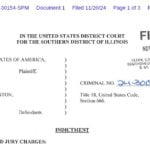Atlanta, IL. (ECWd) –
In a letter dated October 6, 2017, and addressed to the Logan County State’s Attorney’s Office, the attorney, Phillip Lenzini, who wrote a quick email to Bill Thomas several months earlier, decided to make an attempt at justifying Thomas’ actions as being within the Public Officer Prohibited Activities Act’s provisions. As we write below, his attempt failed miserably.
One part of particular interest to us (starting on page 2 below), is Lenzini’s discussion of Section 3 of the Public Officer Prohibited Activities Act, 50 ILCS 105/3, and in particular, his interpretation of subparagraph b-5 – which he opines that the watchdogs’ attention span must have worn out prior to getting to that [subparagraph].
We disagree, as we indeed contemplated and studied that subsection and others, and came to the opinion that they did not apply to a Public Library District Trustee, and since they did not apply, there was no need to write about them. However, just so our readers know that our attention span did not run out, here goes:
Public Officer Prohibited Activities Act, 50 ILCS 105/3(b-5) (emphasis is ours):
(b-5) In addition to the above exemptions, any elected or appointed member of the governing body may provide materials, merchandise, property, services, or labor if:
A. the contract is with a person, firm, partnership, association, corporation, or cooperative association in which the interested member of the governing body of the municipality, advisory panel, or commission has less than a 1% share in the ownership; and
We skipped the previous subparagraphs (“a” and “b”) because the attorney was only concerned that our “attention span wore out” after the previous two subparagraphs.
There are subparagraphs B, C, and D of (b-5) that only apply IF a person can pass subparagraph A, which Thomas could not.
In order to understand subparagraphs “A” and “B”, we must know the definitions applied to words within the Public Officer Prohibited Activities Act. These words are “municipality – advisory panel – commission”
This Act refers to and distinguished different offices in different sections of the Act, such as:
- “County Board” and “County Board Member” in Sections 1, 1.1, and 1.2
- “Municipal Board Member” and “Alderman of a city” and “Member of the Board of Trustees of a Village” in Sections 1.3 and 2
- “Township supervisors and trustees” in section 2a
- “No person holding any office either by election or by appointment” and “advisory panel or commission” and “director serving on a hospital district board” in section 3(a)
- “Member of the governing body of a municipality” in sections 3(b)(1)(A) and 3(b)(2)(A)
- “Member of the governing body of a municipality, advisory panel, or commission” in section 3(b-5)
- “Members of the governing body of a public entity” in section 3(c)
Did you see anything mentioning a Trustee of a Public Library District? We didn’t either, which means only section 3(a) applied to Bill Thomas – who was a person holding an office by election or appointment, which is stated as a prohibition, with the only exceptions to the prohibition found in sections 3(b)(1)(A), 3(b)(2)(A), and 3(b-5).
Section 4 mentions everyone when it states that violations of this Act are Class 4 Felonies. “Alderman, member of a board of trustees, supervisor, or county commissioner, or other person holding any office, either by election or appointment under the laws or constitution of this state” – see how they included everyone in this section? Even a Public Library District Trustee is included in this section 4 (as “other person holding any office”).
Reading the prohibitions as a whole, it is abundantly clear the only exceptions under section 3 are “members of the governing body of a municipality, advisory panel, or commission” – this does not include an elected or appointed Public Library District Trustee.
Section 3(b-5) does not apply since Bill Thomas was not a member of the governing board of a municipality.
How anyone, let alone an attorney, can read section 3(b-5) to say “Basically (b-5) says in addition to those any library board member may provide property etc, . . .” is beyond our imagination, especially when the qualifying language for the exception was to be a “member of the governing body of a municipality, advisory panel, or commission.” A library district trustee is none of those. You must read it (b-5) as a whole, noting that each and every subparagraph applies to the exception – thru the use of the word “and” instead of “or”.
For further proof that a library board trustee is not a “member of the governing body of a municipality” one can read the Public Library District Act, 75 ILCS 16/1-5, where it defines “Board of Trustees” and “Municipality” and “Trustee”
- “Board” or “board of trustees” means a board of trustees created under this Act to administer this Act.
- “Municipality” means a city, village, or incorporated town.
- “Trustee” means a trustee elected or appointed under this Act.
Section 30-35 of the Library District Act never states the district is a municipal corporation, instead, it states the district is a “body politic and corporate”
In closing, no, Mr. Lenzini, our attention span did not wear out prior to reading b-5 – we simply formed the opinion, through reading the actual words of that paragraph, that it did not apply to Bill Thomas or any other member of the Board of Trustees of a Public Library District – and we also believe your opinion of that section is inaccurate.
ATTY-Letter-To-SA.
Our work is funded entirely thru donations and we ask that you consider donating at the below link.








No Comments
Sorry, the comment form is closed at this time.